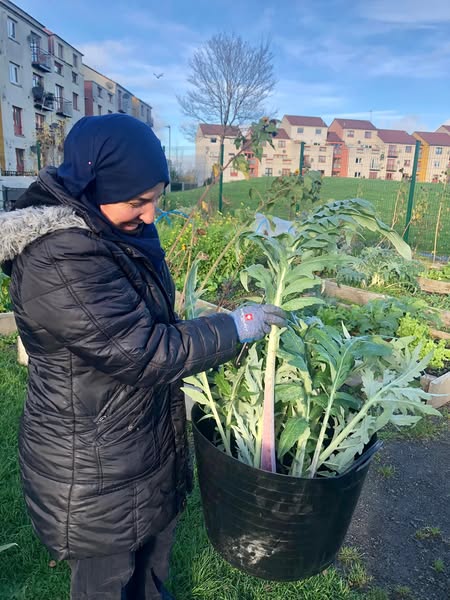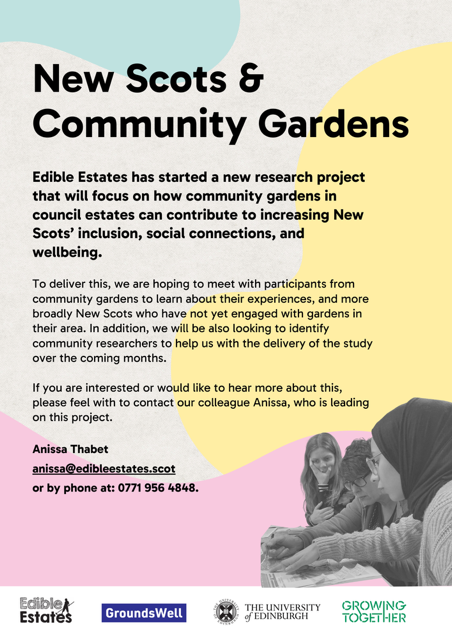A New Research Project Is Underway: New Scots and Community Gardens
June 29, 2025

How can community gardens in Edinburgh’s council estates support New Scots’ social inclusion, facilitate connections within their communities, and improve their wellbeing?
Funded and developed by GroundsWell, and sponsored by The University of Edinburgh’s School of Health in Social Science, Edible Estates and Growing Together are collaborating to undertake a new, six-month research project investigating the ways which community greenspaces on council estates can serve as inclusive spaces that foster community and social connections, subsequently contributing to the overall wellbeing of those who came to live in Scotland from abroad in the last decade, and who we refer to as ‘New Scots’.
Through community research and engagement, we are hoping to hear about people’s experiences of using community gardens, and with that reflect on how we can make these spaces and the activities we develop in them more accessible and welcoming for everyone, including New Scots. This will also include identifying potential barriers that prevent people from getting involved, e.g. time commitments, language barriers, a sense of belonging, lack of gardening skills.

Why ‘New Scots’?
New Scots face significant challenges and disadvantages upon arriving in Scotland, including but not limited to, navigating precarious living situations, unfamiliar people and places, and language barriers.
Although the mainstream definition for ‘New Scots’ is the one used by the Scottish government in various New Scots Refugee Integration Strategies from 2013, which primarily refers to “people living in Scotland who have been forcibly displaced or are making a claim that they have a well-founded fear of persecution,” for the purpose of this study we will be using a broader term, seeking to include the maximum people within the definition. Thus, when using the term ‘New Scots’ we will be referring to people who migrated from abroad in the last decade, and who have made their home in Scotland. Given that the study focusses on feelings of belonging, community, and wellbeing, we believe this term condenses best this spirit of inclusiveness.
The New Scots and Community Gardens research project hopes to stand by this initiative, by showcasing that inclusion and accessibility for New Scots does not have to be an institutionalised and top-down approach, rather that the role of communities and ground-up, grassroots work is essential.
The Project
Alongside community researchers, Senior Community Researcher Anissa Thabet, who is leading the project, will use guiding questions in a mixture of group and one to one settings to open a non-judgemental conversation with New Scots about their experiences – whether they currently or previously attended a community garden, or have not yet engaged.

Anissa Thabet: Senior Community Researcher
While the project’s immediate outcome will be two research papers published by Edinburgh University as part of their study: ‘Integrating New Scots Into Local Communities Through Community Growing Projects,’ we’re hopeful that it will ultimately promote the role of community gardens in bringing people together and creating hubs for social inclusion that stand in solidarity against negative and polarising narratives on migration. Community gardening is a conduit that can facilitate spaces that go beyond food growing, and we’re hoping to highlight just that!
If you are interested in learning more or getting involved, please contact anissa@edibleestates.scot / 07719564848.

You may also be interested in…
Community Gardens As Creative Spaces: Hutchison Craft Day
Talking All Things ‘The Right To Grow’: Interview With Councillor Hal Osler
Dumbiedykes Growers: New Garden Site Transformed For The 2025 Growing Season